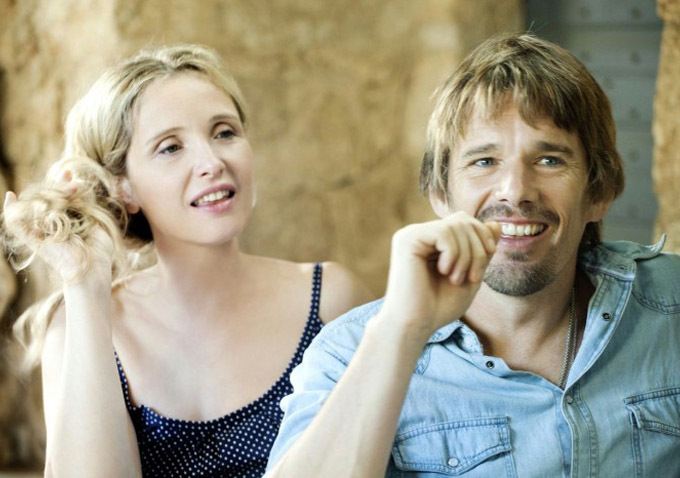 Why won’t Linklater, Hawkes and Delpy shut up?
Why won’t Linklater, Hawkes and Delpy shut up?
By Armond White
Following Before Sunrise (1995) and Before Sunset (2004), Before Midnight’s ongoing chronicle of an aging, talkative, narcissistic couple Ethan Hawke and Julie Delpy (he’s author of two books This Time and That Time; she’s artistic) threatens to become the The Thin Man series for indie movie hipsters.
And that’s precisely the problem. Jesse (Hawke) and Celine (Delpy) are dramaturgically thin. Like any sequel, Before Midnight follows a formula: Jesse and Celine babble, flirt, babble, fight, babble and reunite. This time they jabber while vacationing in Greece which director Richard Linklater photographs like Hoboken (not the Mediterranean jewel of Clare Peploe’s Greece in High Season) just to keep the bland franchise” aesthetically” consistent. Ha!
No doubt this talkathon appeals to indie geeks who haven’t realized that cinema is a visual medium; basing the series on dialogue allows its fans to utilize the screen simply as a vanity mirror. This verbal emphasis suggests that the script (credited to Linklater and his actors) might well include improvisation. But is it the actors or the characters who think every thought in their heads must be uttered?
Hawkes and Delpy seem so natural in these roles that their characterizations stress behavior over action; self-involvement over interaction. The opening scene shows Jesse escorting his teenage son to a return flight back to America where he lives with his divorced mother. The possibility that Jesse will deal with the personal complications of parenthood continues when Celine arrives with their angelic twin daughters. His guilt and her self-sacrifice promise drama. But the children and their obligations are soon shoved off-screen, leaving Jesse and Celine to imbibe egotism the way Nick and Nora Charles downed martinis.
The European locale doesn’t sharpen their sense of being in the cosmos because their world only extends as far as their noses. Jesse’s scraggy gruffness and Celine’s spreading rear-end displace any eroticism; what’s highlighted is the way these characters still embody all the liberal pieties, biases and affectations. Their constant boasting and self-flattery and philosophizing accurately reflect the utter banality of the half-educated–the essence of all Linklater’s films.
Before Midnight’s most profound observation isn’t a sense of mortality from approaching middle-age (as suggested by the title) but a facile agnosticism. Celine accuses Jesse of being “a closet Christian” then commits blasphemy in an ancient church. Existentialism is offered when an elderly woman mourns “We are important to some but we are just passing through.”
Later, Celine argues “There’s no one human state. The human state is multiple.” That’s really funny because Before Midnight, like Before Sunrise and Before Sunset, has but one mode: discursive self-infatuation. Only when the parenthood subject crops up later do Jesse and Celine focus their logorrhea. They get personal and hurtful. Delpy throws herself into Diane Keatonesque emotional extremes while Hawkes’ exasperates to a draw. It’s momentarily gripping–what Noah Baumbach can’t do–yet Linklater does nothing with it. He makes the mistake of referencing Roberto Rossellini’s marriage drama Voyage to Italy and even imitates the climactic sunset moment of Eric Rohmer’s Le Rayon Vert. This is hipster filmmaking at its most ignorant: Linklater, Delpy and Hawkes don’t seem to realize that Rossellini and Rohmer’s masterpieces were about miracles, not mundane naturalism.
Follow Armond White on Twitter at 3xchair
